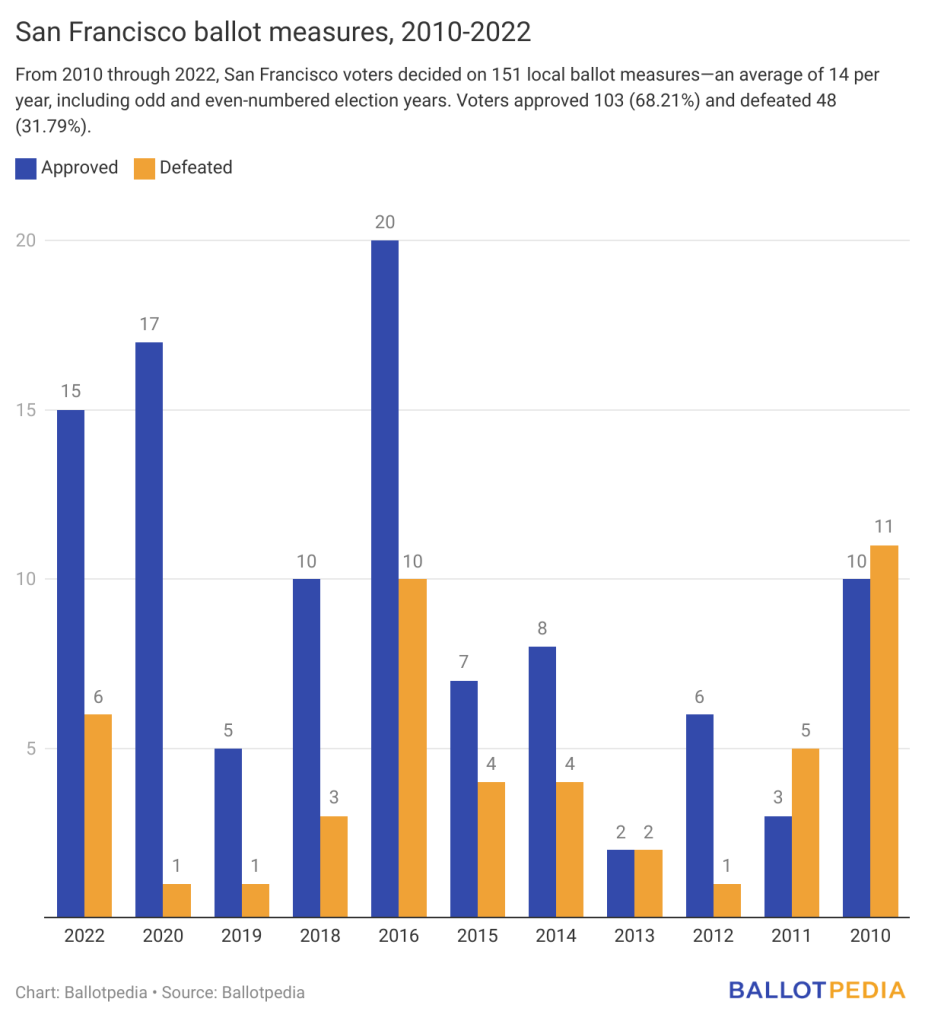Voters in San Francisco, California, will decide on seven ballot measures on Mar. 5, 2024, including one bond measure, one charter amendment, four ordinances, and one declaration.
The ballot measures concern topics related to housing bonds, allowing commercial spaces to be converted to residential properties without incurring a real estate transfer tax, local ethics laws, drug screening requirements for recipients of public benefits, student math requirements, and changes to the San Francisco Police Department and policing procedures.
Proposition A would authorize San Francisco to issue $300 million in bonds to construct, develop, acquire, or rehabilitate affordable housing, including constructing 46,598 very low- to moderate-income housing units by 2031 as required by state law; authorize a property tax increase (projected to be an average of $5.70 per $100,000 assessed value) through 2047 to repay the bonds; and allow landlords to pass through up to 50% of resulting property tax increases to tenants.
Proposition A is supported by Mayor London Breed, the Council of Community Housing Organizations, the San Francisco Labor Council, and the San Francisco Democratic Party. The San Francisco Republican Party opposes the measure.
Proposition B would set minimum police officer staffing levels; require the city to budget enough money for at least five years to pay the amount of police officers employed in the previous year; require the Police Commission to request enough money to pay for minimum police staffing levels; authorize the San Francisco Police Department to introduce amendments to its budget; and create a fund for police recruitment that will last for five to 10 years.
Proposition B is supported by the San Francisco Democratic Party and opposed by the San Francisco Republican Party.
Proposition C would exempt property from the real estate transfer tax (ranging from 0.5% to 6%) the first time commercial property is converted to residential use for properties receiving final approval before January 1, 2030; and limit the total amount of space that can be exempt from the transfer tax to an aggregate total of five million square feet.
Proposition C is supported by the San Francisco Republican Party and opposed by the San Francisco Democratic Party.
Proposition D would change city ethics laws, including expanding restrictions on gifts that can be received by city officers and employees.
Proposition D was placed on the ballot by the San Francisco Ethics Commission and is supported by both the San Francisco Democratic and Republican parties. Eve Del Castello (R), president of the Republican Forum of San Francisco and 2024 congressional candidate, opposes the measure.
Proposition E would make the following changes to the San Francisco Police Department’s reporting requirements and use of technology:
- limit the amount of time a patrol officer may spend on administrative tasks to 20% of on-duty time;
- require written reports for use-of-force events only when a physical injury occurred or if a firearm was removed from an officer’s holster;
- allow body camera footage to satisfy reporting requirements;
- allow the use of drones along with or instead of vehicular pursuits; and
- allow installation of surveillance and facial recognition cameras without approval from the police commission or board of supervisors.
Proposition E is supported by San Francisco Mayor London Breed. The American Civil Liberties Union of Northern California opposes the measure.
Proposition F would require drug screening of individuals receiving County Adult Assistance Program (CAAP) benefits for individuals suspected by the city to be using illegal substances and requiring the individual to participate in treatment programs (if the treatment program is free) to continue receiving assistance benefits.
Proposition F is supported by Mayor London Breed and the San Francisco Republican Party. It is opposed by the San Francisco Democratic Party.
Proposition G would declare it the official policy of the county and city of San Francisco to urge the San Francisco Unified School District (SFUSD) to offer Algebra 1 to students by the eighth grade.
Proposition G is supported by both the San Francisco Democratic and Republican parties.
To vote on Mar. 5, vote-by-mail ballots must be postmarked on or before Mar. 5, and received by Mar. 12, 2024. On Mar. 5, polls will be open from 7:00 a.m. to 8:00 p.m.
In 2024, Ballotpedia is covering local ballot measures that appear on the ballot for voters within the 100 largest cities in the U.S., within state capitals, and throughout California.
Ballotpedia is also covering a selection of election-related ballot measures, including electoral systems like ranked-choice voting, and policing-related ballot measures outside of the largest cities.
From 2010 through 2022, San Francisco voters decided on 151 local ballot measures—an average of 14 per year, including odd and even-numbered election years. Voters approved 103 (68.21%) and defeated 48 (31.79%).

Additional reading:


